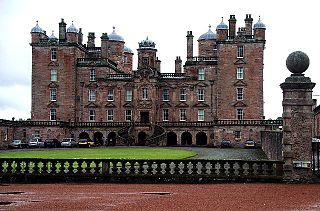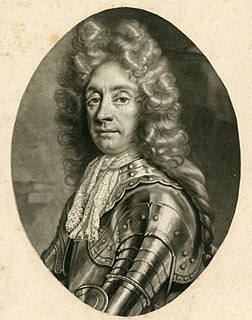Related Research Articles

The Treaty of Limerick, signed on 3 October 1691, ended the 1689 to 1691 Williamite War in Ireland, a conflict related to the 1688 to 1697 Nine Years' War. It consisted of two separate agreements, one with military terms of surrender, signed by commanders of a French expeditionary force and Irish Jacobites loyal to the exiled James II. Baron de Ginkell, leader of government forces in Ireland, signed on behalf of William III and his wife Mary II. It allowed Jacobite units to be transported to France, the diaspora known as the Flight of the Wild Geese.

The Williamite War in Ireland, was a conflict between Jacobite supporters of deposed monarch James II and Williamite supporters of his successor, William III. It is also called the Jacobite War in Ireland, Williamite Conquest of Ireland, or the Williamite–Jacobite War in Ireland.

The Battle of Aughrim was the decisive battle of the Williamite War in Ireland. It was fought between the largely Irish Jacobite army loyal to James II and the forces of William III on 12 July 1691, near the village of Aughrim, County Galway.
Robert Lundy was a Scottish army officer best known for serving as Governor of Londonderry during the early stages of the Siege of Derry.

Godard van Reede, 1st Earl of Athlone, Baron van Reede, Lord of Ginkel, born in the Netherlands as Baron Godard van Reede, was a Dutch general in Williamite service who rose to prominence during the Williamite War in Ireland.

A Williamite was a follower of King William III of England who deposed King James II and VII in the Glorious Revolution. William, the Stadtholder of the Dutch Republic, replaced James with the support of English Whigs.

Limerick, a city in western Ireland, was besieged twice in the Williamite War in Ireland in 1689-1691. On the first occasion, in August to September 1690, its Jacobite defenders retreated to the city after their defeat at the Battle of the Boyne. The Williamites, under William III, tried to take Limerick by storm but were driven off and had to retire into their winter quarters.
Nicholas Purcell, 13th Baron of Loughmoe was the son of James Purcell of Loughmoe and the maternal nephew of James Butler, 1st Duke of Ormonde.
The Break of Dromore took place on 14 March 1689 near Dromore, County Down in the early stages of the Williamite War in Ireland. It featured Catholic Jacobite troops under Richard Hamilton and Protestant Williamite militia led by Hugh Montgomery and Arthur Rawdon.

Lieutenant-General James Douglas (1645–1691), younger brother of the Duke of Queensberry, was a Scottish military officer, who served as MP for Peeblesshire in the 1685 to 1686 Parliament of Scotland.
Robert Ramsay was a Scottish Jacobite soldier noted for his service during the Williamite War in Ireland. A Roman Catholic and veteran of the "French Brigade" which served in the Third Anglo-Dutch War under the Duke of Monmouth, Ramsay held the post of Adjutant-General of Foot in the English Army prior to the deposition of James II in the 1688 Glorious Revolution.
Henry Wharton was an English soldier known for his service in the Williamite War in Ireland, where he died in 1689. He was a distant relation of his namesake the writer Henry Wharton.
Sir Charles Carney was an Irish professional soldier, who later in his career became a Jacobite. He served as an officer in the Irish Army of James II during the Williamite War in Ireland.
Charles MacCarthy More was an Irish Jacobite soldier of the seventeenth century known for his service during the Williamite War in Ireland.
The raid on Newry took place in November 1689 during the Williamite War in Ireland when a Franco-Irish force loyal to James II attacked the Williamite garrison of Newry in County Down. The raid was carried out by the French Major General Alexandre de Rainier de Droue, Marquis de Boisseleau a French officer serving with James' Irish Army. It was largely unsuccessful and the Jacobite forces withdrew having suffered casualties.
Mark Talbot was an Irish soldier and politician. He was born in Ireland and served in the French army during a time when Irish Catholics were prohibited from serving in the Irish and English armies. His father rose in prominence during the reign of the Catholic James II of Ireland, who purged Protestants from the military and replaced them with Catholics.
Sir William Franklin was an Irish politician and soldier of the seventeenth century.
Dominic Sheldon, often written as Dominick Sheldon, was an English soldier. A leading Jacobite he served in James II's Irish Army during the Williamite War between 1689 and 1691. He was a noted cavalry commander, present at the Battle of the Boyne and Battle of Aughrim. Later after going into exile, he rose to the rank of lieutenant general in the French Army. He was also remained a prominent courtier at the Jacobite court in exile at Saint Germain.
Jacob Richards was an Irish soldier of the seventeenth century known for his service with the English Army. In the War of the Two Kings in Ireland he fought for William III against the Jacobite Irish Army of James II. During the campaign he was Chief Engineer with charge of the Royal Artillery.

Thomas Maxwell was a Scottish professional soldier.